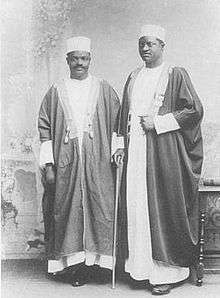Apolo Kagwa

Apolo Kagwa (standard Luganda orthography spelling Kaggwa) KCMG MBE (1864–1927)[1] was a major intellectual and political leader in Uganda when it was under British rule. He was a leader of the Protestant faction and was appointed prime minister (Katikkiro) of the Kingdom of Buganda by King Mwanga II in 1890. He served until 1926. From 1897, Kagwa served as regent until 1914 when the infant King Daudi Chwa came of age.[1] He is Buganda's first and foremost ethnographer.
Career
Kagwa was an administrative apprentice at the royal palace of Buganda when the first Christian missionaries arrived in the 1870s. These palace apprentices, referred to as pages by European historians of the era, were bright youths from all over the kingdom sent to the palace to train as the next generation of leaders. He was one of the earliest converts to the Protestant faith. He nearly became one of the Uganda Martyrs when King Mwanga II fell out with the Christians a few years later. He was reportedly spared execution because he had already shown himself to be exceptionally capable as an assistant in the treasury.[2]
From 1885 to 1887, the kingdom fell into a religious civil war with Protestants, Catholics, and Moslem factions vying for control. Kagwa, still in his twenties, was from early on recognised as the leader of the Protestant faction. A keen rifleman,[3] Kagwa served actively in combat during these wars. The Moslems were in ascendancy in the early part of the war, and Kagwa and other Protestants spent some time in exile in the neighboring kingdom of Ankole.
Prime minister
King Mwanga, temporarily deposed, was restored in 1890 with the assistance of the Protestants, and Kagwa was named Katikkiro (Prime Minister). King Mwanga was again deposed in 1897 when he rejected British rule and led an unsuccessful fight for independence. An infant prince, Daudi Chwa, was named King with Kagwa as one of three regents. Kagwa was one of the negotiators of the Uganda Agreement, by which Buganda became a British protectorate with limited internal autonomy.
The Uganda Agreement of 1900 solidified the power of the largely Protestant 'Bakungu' client-chiefs, led by Kagwa. London sent only a few officials to administer the country, relying primarily on the 'Bakungu' chiefs. For decades they were preferred because of their political skills, their Christianity, their friendly relations with the British, There are their ability to collect taxes, and the proximity of Entebbe (the capital) was close to the Buganda capital. By The 1920s the British administrators were more confident, and have less need for military or administrative support. Colonial officials taxed cash crops produced by the peasants. There was popular discontent among the Baganda rank-and-file, which we can the position of their leaders. In 1912 Kagwa moved to solidify 'Bakungu' power by proposing a second 'Lukiko' for Buganda with himself as president and the 'Bakungu' as a sort of hereditary aritstocracy. British officials vetoed the idea when they discovered widespread popular opposition. Instead British officials began some reforms and attempted to make the 'Lukiko' a genuine representative assembly.[4]
Travels
He visited England in 1902 in his capacity as Katikkiro (Prime Minister), for the coronation of King Edward VII, accompanied by his secretary, Ham Mukasa.[5]
Books
Kagwa authored many books on Buganda, including a general history Bassekabaka ba Buganda, a treatise on laws and customs Empisa z'Abaganda and a collection of folklore Engero z'Abaganda. His history of Buganda included brief histories of the neighboring kingdoms of Bunyoro and Ankole. Some of his books have been translated into English.
He was a strong supporter of the establishment of modern education in Uganda. In particular, he was appalled by what he saw as a tendency of the sons of the nation's leaders to grow up spoiled, in contrast to the spartan upbringing his generation received from the palace apprenticeship system. He worked with British missionaries to establish boarding schools, notably King's College Budo, explicitly to keep young noblemen from growing up spoiled.[6]
His manuscripts and personal papers are in the Africana collection of the Makerere University library in Kampala.
During the later years of his ministry his relationship with the British colonial government was tense; Kagwa believed Buganda's autonomy was being repeatedly encroached upon.
In 1918, he was made an honorary member of the Order of the British Empire for services in raising and organising native levies and local Defence Corps in the Uganda Protectorate.[7]
He had 23 children, including Michael Kawalya Kagwa (who served as Buganda's Katikiro from 1945 to 1950)[8] His grandchildren include Apollo Kironde, Uganda's first Ambassador to the United Nations.
Bibliography of his writings
- Kagwa, Apolo. The customs of the Baganda (Columbia University Press, 1934).
- Kagwa, Apolo. The kings of Buganda (East African Publishing House, 1971).
References
- 1 2 Encyclopaedia Britannica
- ↑ C.C. Wrigley, "Apollo Kagwa: Katikkiro of Buganda," in Obaro Ikime, ed., Leadership in 19th century Africa: essays from Tarikh (Longman, 1974) pp 116-127.
- ↑ M. Wright, Buganda in the heroic Age, (Oxford University Press, 1971)
- ↑ Michael Twaddle, "The Bakungu chiefs of Buganda under British colonial rule, 1900–1930." Journal of African History 10#2 (1969): 309-322.
- ↑ Mukasa, Ham (1904). Uganda’s Katikiro in England: Being the Official Account of His Visit to the Coronation of His Majesty Edward VII. London: Hutchinson & Company.
- ↑ Hattersley, C.W. The Baganda at Home. Frank Cass Ltd, 1968
- ↑ The London Gazette: (Supplement) no. 30576. p. 3289. 12 March 1918.
- ↑ World Statesmen: Uganda
Further reading
- Mukasa, Ham. Sir Apolo Kagwa Discovers Britain (Heinemann Educational Books, 1975).
- Twaddle, Michael. "The Bakungu chiefs of Buganda under British colonial rule, 1900–1930." Journal of African History 10#2 (1969): 309-322.
- Wrigley, C.C. "Apollo Kagwa: Katikkiro of Buganda," in Obaro Ikime, ed Leadership in 19th century Africa: essays from Tarikh (Longman, 1974) pp 116-127.
Primary sources
- Kagwa, Sir Apolo. Select Documents and Letters from the Collected Apolo Kagwa Papers at Makerere College Library (Makerere University College Library, Photographic Department, 1964).